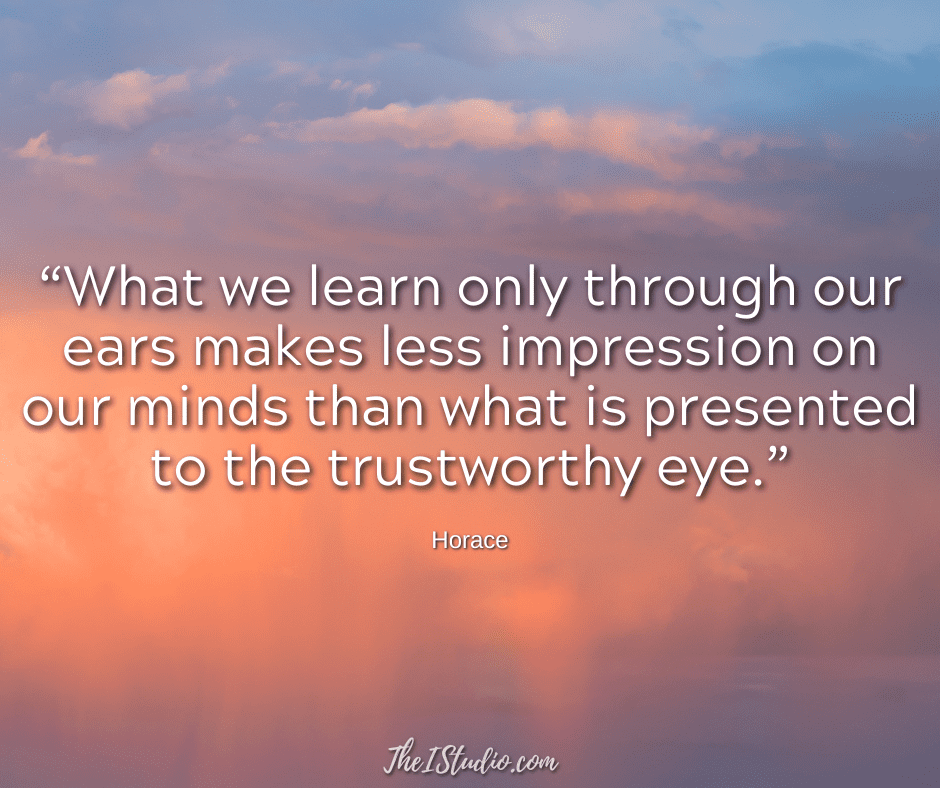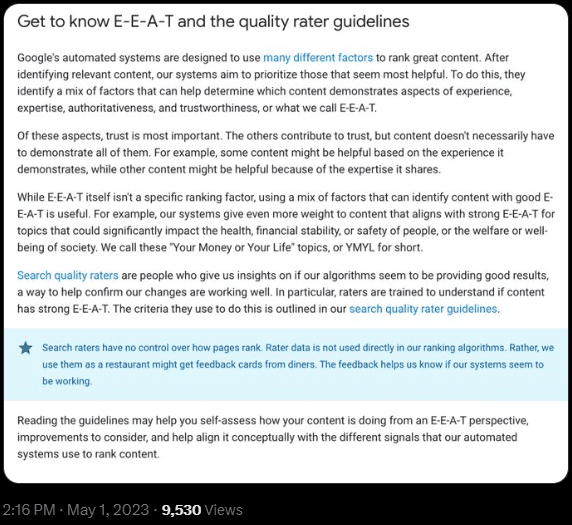UPDATED! Guide to Google SEO and E-A-T (Now E-E-A-T)

If you follow SEO, you may have noticed an acronym that has become part of the conversation. This acronym tells you all you need to know and seriously consider regarding SEO. That acronym was E-A-T and stands for Expertise, Authority, and Trust.
This post will try to provide a history thread on this topic and update as often as Google makes official updates.
02.21.24: Google: We Want To Reward The Best Content No Matter Site Size
Search Engine Roundtable posted an article about content vs. website size. Google is saying size doesn’t matter… Interesting article. Here again, E-E-A-T is mentioned basically as a concept for creating customer-centric content – just one piece of the SEO puzzle.
02.06.24: Google To Clarify E-E-A-T & Quality Rater Guidelines Documentation
So, the above article argues that EEAT is not a ranking factor per se, but if you read between the lines, you find that EEAT is a signal. And Google algorithms listen to all kinds of signals. I look at EEAT as good advice. If a search engine publishes information on what they think is a good website, use it to your advantage.
05.01.23: Creating helpful, reliable, people-first content.
While E-E-A-T is not a ranking factor, “using a mix of factors that identify content as good E-A-T is useful.”
12.15.22 UPDATE: Google has added another E for Experience. E-E-A-T.
There are many great resources for a deep dive into E-E-A-T, and I recommend that you do, you know, the “knowledge is power” thing. However, in this post, I’m just going to give you an overview of E-E-A-T so that you can start reviewing your site and content.
I will update this post as new information and insight are discovered. However, it is clear that it is time to embrace what is required to rank well, or you will never do so.
What Does E-E-A-T Mean?
Expertise, Authoritativeness, Trustworthiness (E-A-T), and now E-E-A-T adding Experience on 12-15-22. [Read more here...]
Experience, Expertise, Authoritativeness, and Trustworthiness
Google’s Site Quality Rater Guidelines is a 176-page PDF document covering what Google site evaluators use in their determinations. These guidelines just ad a pretty substantial update on December 15, 2022.
December 2022 Change Log
A Little History…
This is how sites have consistently been ranked for as long as I can remember before an official name was applied. Actually, it’s just common sense, allowing the cream to rise to the top.
But now, we have some Google documentation on the thought process involved and another way to explain some of the variables you need to consider regarding your search engine rankings.
Discussions with John Mueller of Google:
Here’s what Google said on 2.18.22
At the 10:30 mark. John Mueller of Google said that while there is no E-A-T score that Google uses, E-A-T is important and indirectly in the search ranking algorithm. Here’s the entire Office Hours video for your review:
11.16.22: From the VP of Search at Google
E-E-A-T Summary
Experience
Consider the extent to which the content creator has the necessary first-hand or life experience for the topic. Many types of pages are trustworthy and achieve their purpose well when created by people with a wealth of personal experience. For example, which would you trust: a product review from someone who has personally used the product or a “review” by someone who has not?
Expertise
Are you knowledgeable on the topic of your site? This is where putting efforts into building your brand consistently across platforms will pay off. This is why I significantly emphasize crafting a website’s About Page when I work with my clients because it contributes to the story of their E-E-A-T.
Even more so if you are a YMYL site. “Your Money or Your Life.”
“YMYL” is mentioned 120 times in the search quality evaluator guidelines.
Pages that fall into YMYL are…
For YMYL topics, the reputation of a website should be judged by what experts in the field have to say. Recommendations from expert sources, such as professional societies, are strong evidence of a positive reputation.
GSQEG, 3.3.1 Reputation of the Website
Topics and Expertise
This doesn’t require an “official” expert like a lawyer or doctor with educational credentials. Life experience can provide that expertise indicator as “everyday experience.” Once again, the quality and volume of your content should back this up.
Pages that share first-hand life experience on clear YMYL topics may be considered to have high E-E-A-T as long as the content is trustworthy, safe, and consistent with well-established expert consensus. In contrast, some types of YMYL information and advice must come from experts.
GSQEG, 3.4.1 YMYL Topics: Experience or Expertise?
Authoritativeness
Is it clear who is creating the content? Does experience back up the content? Are you a credible source? (Or just a site churning out shallow or aggregated content to support all your ads?) Credibility is also viewed not by the content alone but through outside reviews and testimonials.
This goes for your Author profile too! Be sure to list all your credentials and provide a detailed view, including any accreditation and endorsements. Make clear why you are an expert on the topics you write about.
Trustworthiness
Is the site creator, content, and overall site quality easily trusted? This includes security (HTTPS). Contact information, policy pages, and privacy statements also contribute to trustworthiness.
The bottom line is that your website needs to be credible in every aspect, from visuals to content, context, and structure. Every little thing you do or don’t do can affect its E-E-A-T score.
FREE: Find new keywords for your market…


It’s All About High Quality, Baby
Back in the day, putting up your website produced results. Primarily because there weren’t as many websites which made it easier to get found. The bar wasn’t as high as it is today. Now, to get found depends on algorithms and social media proof. All depend on users and platforms determining your expertise, authority, and trustworthiness. And, boy, has that bar been raised.
If you think about it, you apply E-E-A-T principles every time you land on a new site, even if subconsciously. Then, you determine if the information is credible and are willing to trust that site with your hard-earned dollars.
Quality and Satisfaction are Key
Shoot for high quality. Not average, not just enough. High quality.
One can say that quality is in the eye of the beholder. But not when it comes to SEO. Your website overall, particularly your content, needs to benefit and satisfy that purpose well.
Pages with the following characteristics should be considered Untrustworthy:
GSQEG, 4.5 Untrustworthy Webpages or Websites
Ask Yourself These E-E-A-T Questions
Now that you understand what is considered a high-quality site, you know what you need to do. First, review your main content, visuals, and navigation and ensure it is the best for your site visitors.
Yes, you need to do whatever you can to make your site zippy too. While updates and algorithms can impact your rankings, creating great content is still the magic bullet, if any. However, no one will stick around for all that great content if your site hangs.
None of this is really “new” news. It’s the way sites have been judged from the start. Do you want to be viewed as an expert? Write like one – a lot. Do you want to be an authority on a subject? You’d better be one because you can’t fake that.
Want to get great rankings?
Target visitor intent while making sure your site pops and is user-friendly. If you want to be trusted, there are no shortcuts.
At your service,





